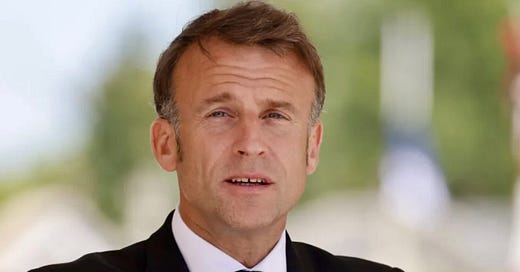Europe Trembles
Elections, political uncertainty and Russia put the old continent into uncharted waters
For sure, elections for the European Parliament are not as important as national elections and as a result turn-out is usually on the low end. In Croatia for instance only 21% bothered to show up, the European average came in at 51%. Yet, they are a barometer of where things are going and if we take last week’s results it is clear that the political landscape is shifting. In France and Germany, but also in Italy and Belgium, right-of-centre populist parties did really good business. It is not a stretch to argue that a counter-establishment movement is now successfully challenging in particular the immigration and green policies that have so far characterized the mainstream European centre.
Most dramatic was the march of the right in France where president Macron in response decided to dissolve parliament and schedule elections in what many consider is a reckless gamble to try and regain the political initiative. He is banking on anti-right sentiments to give the political centre a chance to combine forces and secure sufficient support for the remainder of his term as president. In Germany the governing Social-Democrats and Greens suffered a significant electoral setback and so the Franco-German power axis, always the dominant force in the EU, is now under pressure.
It is of course one thing to recalibrate the environmental agenda and address the deep and valid concerns over illegal immigration, it is quite the other to now find unanimity on urgent issues like the war in Ukraine. Note that Europe’s emerging right is a mixed bag of populists and anti-establishment candidates and far from a unified voice to decisively turn Europe around. But as Italy and The Netherlands are now seeing, they have the ability to adopt and adapt a more mainstream tone and form actual governments. The political centre was able in this election to ward off that challenge on the European level, but a trend has been set. The door to for instance Marine LePen to become France’s next president in 2027 is now wide open and the sun may be setting on the Macron era.
Again, the right in Europe, much like Trump in the US, is often perceived to take a far more conciliatory tone when it comes to Putin’s Russia. To me it is an irony that there is no unity on the threats Europe is facing: the folks arguing that immigration is tearing down the continent are oblivious to the Putin threat, the centrists that do want to take action on Russia and Ukraine have dropped the ball on immigration and related matters for which they have now paid a price. The net result is a divided Europe which, if you add the uncertain outcome of the US presidential election in November, only plays into the hands of anti-Western forces.
Putin’s Gain?
So let’s take a closer look at the Russian threat which is still not to be underestimated, on the contrary. A win or even a stalemate with Russian dominance in Ukraine will embolden Putin and allow him to make his next move. That will mean a direct conflict with NATO which is what former CIA chief David Petraeus argued in an interview earlier this week. Quite prescient.
And support for Ukraine has not been up to the level that is required to ensure Putin is boxed in and so he effectively has the upper hand. I really enjoyed this short video from William Alberque, a former NATO security expert who explains how Putin has been winning and the West has been struggling to confront the threat. Now if you factor in how the EU election has created more divisions than unity, you will get the picture. Both Petraeus and Alberque make the clear point that things do not look all that good if you are not committed to see the war in Ukraine through in a really decisive matter. The shifting political landscape is not helping in finding a unified voice to address the multiple threats that western democracies now face.




General Douglas MacArthur - the most effective/brilliant US general of WWII, said all military failure, can , in the end, can be explained by the words: too late. Too late in assessing the danger of enemies, and too late in preparing to fight them. If this is true, it’s plain to see the worthless European leaders - that is, ALL of them - will be saved only by the US. Defense is a public good, and the US must levy tariffs on all European goods, to make these freeloaders pay. It is absurd for the US to voluntarily provide them defense. And, projects like Nordstream 2 must never be allowed by the US.
All of this is very bad news for our children and grandchildren. Basically as societies we have decided that we are not going to address climate change. I think 3 degrees of warming is probable. More than two degrees inevitable. The political winds generally are pushing us towards more warming. An interesting question, will more open or more closed societies better adapt to declining populations? Japan provides one early case study.